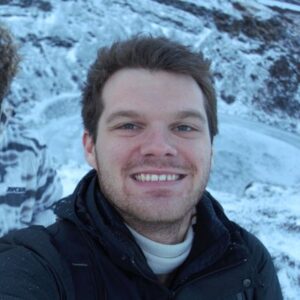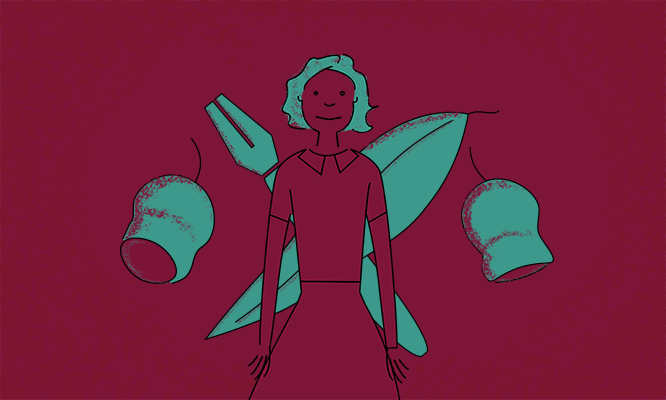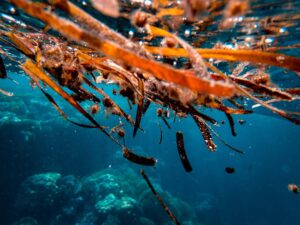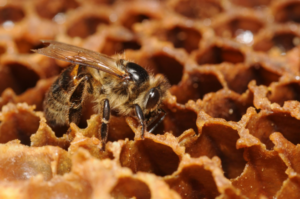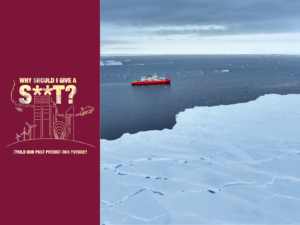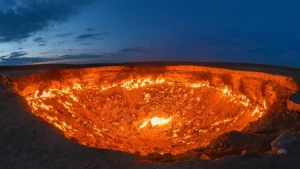Transcript
What Makes WA’s Environment Special?
- Host: Rose Kerr
- Guest: H M Waugh
**Cue music (intro theme)
Rose – Welcome to the Particle Podcast where we talk about Science and the people who just love it. My name is Rose, and I was the kind of kid who loved both Biology and English Lit. Today’s guest ticks both those boxes for teenage Rose. I’m delighted to be joined by H. M. Waugh an Environmental Scientist turned Educator turned Writer. We had a chat about mountains, writing and Rhino poo.
Rose – Thank you for joining us Heather.
Heather – Thank you for having me, I like your shirt by the way, for those who can’t see it, it’s covered by awesome wildflowers and cockatoos and it just rocks.
Rose – It’s very on-theme isn’t it?
Heather – Yeah
Rose – Well that brings me to my first question which is what is it that you actually do?
Heather – I do so many things that sometimes my students go how do you have that many jobs? But at the moment I do a lot of teaching, I teach primary school extension kids at the moment and I also teach at the zoo and I write of course, I’m an author so I write. I write science for magazines as well, so Science non-fiction and I volunteer at Kings Park, I do a lot of things.
Rose – You’ve got the dream.
Heather – Yeah exactly I’m actually living the best life at the moment.
Rose – Have you always loved Science?
Heather – I think I have, yeah and I think I’ve loved it before I knew that what I loved was Science because I loved being out in the bush and you know I grew up in New Zealand so it wasn’t really bush it was more like forest, I suppose. Out on the farm, things like that and I remember a teacher and I can’t remember how old I would have been, but he took me through a little bit of remnant forest in our school, the whole class and was starting to teach us about the importance of leaving logs that had fallen down and things like that and that was when I first started to connect that there was a life, you could do this for your life. You know this was science and this was something you could follow that was way back in Primary School and basically I have always had a love of nature and discovering more about it which is Science really, isn’t it?
Rose – Yeah, it is and it’s funny that you bring up, having had that moment. I was the same I grew up on a bush block and it was exploring outside that made me want to do biology, which I ended up doing. What is nature like in New Zealand? Do you miss it? Do you miss what it is like over there?
Heather – I haven’t been back in ages but there is some sort of sigh in your soul when you see the moss and the wetness, and it is just this…it is different, it is very varied as well, you get a lot of the tree ferns and the greenness and things like that um, but you also get some really stark landscapes in New Zealand as well but I’ve been to Tassie so if there are any listeners who have been to Tassie like there’s a lot of similarities between Tasmania and New Zealand when you’re looking at the bush and things like that. Um I remember I flew into Australia when I was nine and it was the middle of winter and I kid you not, I looked out the window and it was so brown, what is this place?-
Rose – Awh!
Heather – -As now, you know it took me a long time to fall in love with nature as it looks here in Perth, with you know, with the starkness, the toughness of these plants and these animals that survive in this climate over here and now I’m absolutely in love with them but there was a long time where I just thought I want nothing of this in my garden. There’s no beauty in this.
Rose – Because it’s so dry.
Heather – Yeah, I think it was still Year 9 or Year 10 I started to go, hang on a minute, actually look at this place, look at how it survives.
Rose – Why should people care?
Heather – It is a big question and we teach that as well in a lot of our courses we have and we ask it of the students and they are like, oh we don’t know? But there is a selfish side to it, if we can protect the environment, we are part of that environment, we are part of that web that is being held together and we don’t understand what holds it together sometimes. So if we can protect that then we are also protecting ourselves; we are protecting our food sources, we are protecting the future medical discoveries we might make and all these sorts of things. But there’s also, everything has an intrinsic right to life and there’s something so calming for me to go out into the bush and to see nature and just immerse yourself in that. I think we as humans we need that, we need nature and I think it would be a sad world if we lost it.
Rose – When you went onto University was it Environmental Science that first grabbed you? Did you know that was what you wanted to do?
Heather – Yes Absolutely; yes I was doing Environmental Science and I think I started out with Biological Science as well, in my second year they bought out a conservation biology so I was able to do both of those together, but the Enviro was the main one that I thought would get me a job and the conservation bio was the one that spoke to my heart, you know, and that’s more of what I am working on now.
Rose – And did you enjoy your time at University?
Heather – I did, yeah, I was there for 3 years and then I did my Honours outside of Uni and probably I loved that even more, yeah, I was working out for WA Herbarium for my honours but like in the dongers out the back with the calm sciences they were at the time and that was amazing ‘ cos suddenly I was in daily contact with people who were doing what I loved, so yeah that was cool.
Rose – What was that project?
Heather – I was studying a critically endangered plant that was up in Eneabba and it’s also in Bullsbrook. So it was comparing it to other plants trying to see, what made it genetically predisposed to being endangered but it also opened up my eyes to how much we have lost out in the wheatbelt and how passionate a lot of people out there are about trying to claw some of that back and get some of our nature back out there.
Rose – For someone who might not know, what are some of the processes in places like the wheatbelt that have caused species to decline?
Heather – The Wheatbelt is probably the main reason why the South West of Western Australia is a global Biodiversity hot spot which on first look it kind of sounds really kind of cool to be a global Biodiversity hot spot, it is, but it also means we have to of lost at least 70% of our native vegetation to be classed as that. I think there are only about 35 in the whole world and we’re one of them. So the Wheatbelt’s lost up to 95% of its vegetation and it was cleared in a time when we just didn’t understand that the soil was not going to stay healthy forever and now it’s needing a lot of inputs from chemicals and things like that. Often the only trees you’ve got left are along the roads, so that-
Rose – Which is so weird!
Heather – -But it was a beautiful forethought to think let’s keep these road reserves but as we widen our roads as we are getting more cars, then we are starting to lose those trees as well. So yeah, the Wheatbelt has lost a lot of its native vegetation and I think it’s quite important that we start to a) Protect that and also understand that if we can re-plant some of that it’s actually been found to help the wheat as well. So you know if you can have corridors of trees and get wildlife starting to come back in, they are finding that the soil is healthier and the wind is less impacting on the wheat so they are actually getting good wheat yields by putting trees back in, in places so…
Rose – It’s a win, win.
Heather – Which also helps with climate change! Because if you can get carbon back in the soil that’s one of the best things for carbon. So we are kind of leading the way in places in Western Australia and that so…
Rose – Is it something that happens a lot that people are doing the replanting?
Heather – I haven’t been out there, like I went to Uni a long time ago, I haven’t been out there for a while… with my kind of Scientist hat on, um , I think it was a couple of wildflower seasons ago I went out there. But you certainly are seeing new plantings coming and you are seeing like if roads have been moved they are thinking about replanting along the side of that new road so it’s not just bear through bear fields and things like that. But we’ve got species like the Carnaby’s, Black Cockatoo that desperately needs not only really old trees with hollows but enough food around that really old tree with a hollow in them for them to raise their chicks. We see them here in Perth but they don’t breed in Perth they breed in the Wheatbelt so they are being attacked on both sides like we have chopped down a lot of their banksia forests that they feed on, when they’re not breeding and then when they go back to try to breed they need a combination of things which is getting harder and harder to find in the Wheatbelt so I think yeah, it’s an opportunity being a biodiversity hot spot; it’s a responsibility but it’s also an opportunity, and if we can work together we could make great changes out there.
Rose – and it could be great for things like Tourism, a sense of place, there are so many extra good things about it. You said it’s been a while since you’ve went there with your science hat on. What did you do after that? Where did you keep going?
Heather – Um I travelled around the world first off which is always recommended um, and that was really wonderful, I did that when I was about 20-21 and then I worked on mining and construction for about a decade, I was working in the Jarrah forests south of Perth and then I spent a bit of time working up in the Pilbara as well so that was just amazing, like I was working where other people have holidays
Rose – Oh that’s nice!
Heather – Yeah, people just don’t understand how amazing it can be to have a job like that. Just some of the most magical moments. So yeah, that was about a decade working there and I would still go up and see the wildflowers and things like that but it was after I was made redundant and my child was born and that’s when I began to have this idea of a complete rethink of what I was going to do. You know, I wasn’t trying to get another mining job and put my daughter in childcare I was going to decide to get to do all these things that ‘little me’ wanted to do. You know ‘little me’ wanted to work at the zoo, why can’t I work at the zoo ‘little me’ you know well ‘little me’ wanted to get a caravan and go around Australia, well do that. You know, we are our dreams, we shouldn’t let them escape.
Rose – When you went travelling when you were younger you know and travelling throughout your life do you find yourself wanting to explore nature in other countries?
Heather – Yes, yeah! I find if I look at too many museums it’s kind of like it all starts to blend together but if I decide to go on a hike for a couple of hours then that is something I will remember and it’s just this moment, this beauty where you really start to understand what a country is and what it’s environment looks like. When I travel I always look for hikes.
Rose – What does Science in WA mean to you?
Heather – Science in WA to me at the moment, is raising the awareness of what we’ve got, ‘cos if you ask some children to talk about endangered species they’re probably going to tell you about the Rhino and the tiger but they won’t know about the Woylie or the Numbat and we’ve got these amazing creatures right here and this ability to make such an impact. So that’s what science is kind of meaning to me now. Inspiring that next generation, telling them what’s out there, inspiring them to learn more because that’s what science to me. Is always that love of learning and I just think if everyone in Perth planted a tree that would feed a Carnaby’s cockatoo then imagine the difference we’d make. You know, we have power when we all start doing one thing so…
Rose – Is that something that you thought you’d get into? You know, back when you were at Uni the first time did you see yourself moving into an education or science communication role or is this something you already liked?
Heather – I, um liked education, I always thought I would like to be a teacher training the crews on the mine sites was my favourite… well one of my favourite things to do, my favourite was like getting in the car and just going out getting out, checking all the string monitors by myself actually, that was awesome! They don’t do that anymore technology has taken over and done it for us. Um but yeah, I always loved training and education but it had been kind of that talk when I was at school that I had good grades and people with good grades didn’t do teaching, they did something else. It was surprising enough that I wanted to do environmental science and why weren’t you trying for something higher kind of thing and so there was kind of that stigma to teaching and so it took until I’d had my child and she was full time at school with pre-primary and I thought I’m going to do my grad dip. It’s just a year (I think it’s changed now) it’s just a year and I’m going to do this thing that I’ve always felt I’ve wanted to do and I’m so happy I did ‘cos it’s just opened doors to enjoyment and living a life that I’m really proud of.
Rose – When you were doing working for the mines, I have only really briefly worked in field work, I worked as a Botanist for only a few months but it wasn’t for me, but the field work, tell me some of the stories about the places you went or 4 wheel driving in the middle of nowhere. What was it like?
Heather – Its’ um, I didn’t do so much field work ‘cos I was on the operational side, so I was organising for clearing and then the correct operation of the mine site while it was cleared and then the rehabilitation afterwards.
Rose – ahh cool
Heather – So we would get people like yourself in to do a lot of the monitoring and sometimes I would get to go out with them and going out in some of the old closed sites up north… just amazing! ‘cos they didn’t always close them brilliantly, so again you’ve got that history, you’ve got roads leading to nowhere, you’ve got leftovers of the town they lived in and down in the Jarrah forest one of my all peak moments, there is a little section of old growth forest, just hiding in our mining lease that is completely protected, we are keeping everything out of it (I am still saying ‘we’ because I am back in that feeling like I was working for them) and it was just the most beautiful place because we go to the jarrah forest now but to go to this little section and see you could actually literally of driven a cart with horses between the trees and they were so big and we don’t know why it was kept, but that was my job that we always protected that and that was a really magical kind of place.
Rose – So, so many mines can cause so much destruction on the landscape, was it ever not sad?
Heather – Oh yeah, always sad-
Rose – yeah
Heather – when I had to walk the final clearing line, before something would go through and I just look at what was there and all I had was to say to myself, I am just here to make sure we put this all back.
Rose – Yes
Heather – So people are still going to need this metal we trying to mine, ah, that’s not going to change anytime soon, we need mining, we could up our recycling then we wouldn’t need so much mining but at the moment you know there is still a need for mining so I’m going to make sure we do it the best way we possibly can. But yeah, there’s that bittersweet moment you’re out there and the birds are singing, and you know you see a kangaroo in the distance. It’s just so perfect out there and no one’s been there for a decade because it’s been closed off for the mining and you think we’re bringing bulldozers and everything in here. Your environmental science heart will break a little bit but then you go, I’m going to fix this on the other side, and I know we can, so that used to make me positive.
Rose – It’s just so funny that, you know, at school like we were saying whether you’re too smart to go into teaching or environmental science. It all takes critical thinking and it’s all valuable.
Heather – And you shouldn’t ever be doing something that someone else expects you to do. Do what you want to do.
Rose – Yeah
Heather – Do what you’re going to love-
Rose – yeah
Heather – – and be passionate about ‘cos that’s your life.
Rose – yeah, It’s all you’ve got (laughs)
Heather – And do a hundred things as well you know, it used to be like do one thing and that’s going to be your job forever… how boring.
Rose – Yeah
Heather – I think students these days they don’t just have this one path, try this thing and when something else pops us grab it; grab the opportunity.
Rose – Just to jump in with a little bit of extra information, H M Waugh’s book is called ‘The Lost Stone of Sky City’ it’s described as being a mountain adventure full of intrigue, friendship and magic and Its aimed at kids 9-13 years.
Rose – You have now gone on to write a book, can you tell me about how that happened?
Heather – I have always loved writing so it’s not like one day I woke up and went I’m going to write a book. I think as a kid, my love of exploring and being able to put a name on things out in the environment that became my love of science was equally my love of worlds and books, fantasy books and things like that and so I would imagine new stories and then I would imagine new worlds and I’d start writing my own stories and it kind of died away when I was working too hard and too long and then it just started sneaking back and I would go to bed at night wanting to sleep and these characters would be in my head and one day I thought Stuff it, I’m going to write them down. So yeah, it’s been about 5 years I’ve been on that journey where I just thought, this is something I’m going to do. ‘Cos it’s a great thing to do; to write for children. I really find it quite a wonderful honour to write for children. I think it all stems out of the same love because people who read my books say there’s a lot of connection to the environment in it, which I don’t even see but it must be me.
Rose – When you write a book, I guess did you just sit down and write it or it was something that you thought about the characters and you had an idea of what would happen and you kind of like mapped it out as you went and then wrote it, how does it even… How do you write a book?
Heather – Everyone writes a book differently as well I figured out. For me, I need to know a character, at least one character and kind of feel who they are and I need to know basically where they are going and what they are trying to achieve and I really want to feel the world that they’re in. That’s a really important thing so once I can see and feel and taste and smell that world then I think, I’m just going to dive in and I write very quickly so I set myself a fifty thousand word in a month and then I will voom voom voom, every night every moment I’m trying to write something down so it comes out very quickly and I never re-read it until I’ve got to the other end and then I could pick up this thing that’s awful, which has happened once or twice, or I can pick up this thing that I’m like this has got, you know, promising this is good, I can do something with this.
Rose – Who do you send it to, how does that work?
Heather – I’m very lucky in that my older sister was already a children’s book author so she was a member of a group called The Society for Childrens Book Writers and Illustrators which is also called SCBWI. As you can imagine because it’s far too hard to say the other one and so she was like, pestering me you’ve got to come join, you’ve got to come and join and that was actually, I don’t think I would have found them so quickly if I hadn’t known about them, and that was so brilliant because they were so supportive and they always have these events where you are starting to learn this like, where do you go for the next step, what do you do, which publishers are out there, how do you send to a publisher because there’s all different rules in different regions. So yeah that was amazing and it was through them that the first page of my book was noticed by a publisher and they contacted SCBWI, because it was all anonymous and said Whoever’s page that was, can they contact me.
Rose – Where is the book set?
Heather – My book is set in a mountain world because I love mountains. So, it’s set nowhere really but it pulls from all my memories of mountains. It’s a fantasy world but it’s got a lot of the Himalayas, a lot of the desert roads sort of region and the centre of New Zealand, where it is kind of dry looking and harsh and the Andes as well. So, I just got all the pictures of cool places I had been in the mountains and kind of stuck them around myself and used that.
Rose – That’s awesome.
Heather – Yeah, it was fun!
Rose – I can imagine how you’d be able to paint that picture, even just hearing you talk I can imagine it forming, which is really cool. Have you ever met kids who have read the book?
Heather – Yeah, yeah, it’s it’s weird, it’s like “I know who you are.” I’m like “How can you know.” I’ve read your book.” I’m like “Oh, really?” It’s still new as it only came out in October so it’s still like a new thing for me. One of my PEAC courses is a creative writing course and one of the students actually turned up. She had figured out I was an author and she’d found my book and she’d bought it and read it.
Rose – aww
Heather – I was like awwwww. If I could give A’s (which you don’t give in PEAC) I’d give one to you. It’s an amazing moment. So I suppose the take home is if you’re reading a book and you like it, try to put that out there. You know there is so much negativity in the world but it’s just so wonderful as an author to hear that someone likes your book. That’s So, tell people when they’ve done something cool. That’s what I reckon.
Rose – I’ve seen a lot that STEM is now being written as STEAM, so incorporating arts, where do you think Arts fits within Science?
Heather – I kind of think that’s something that really attracts students, to be able to make things, you know with their hands to draw things, you know I’ve also done art courses myself; so I really love to draw. So I think if you can combine all of that and the arts as well as history in the arts I think, you know if you can bring together your Science curriculum and your history Curriculum and your art Curriculum and your maths curriculum and put them all together in one amazing project that your students spend an entire term working on and being absolutely, you know, delving into it and learning everything and being passionate about it. I mean that’s amazing. That’s how I would love to see some of this happening is just combining it all together, they’re not in boxes in the real world. I remember in high school we used to finish our term of Chemistry and we would put away Chemistry and we would pick up Physics, for me I didn’t connect well enough that it’s all the same thing. Yeah and your cell you are learning in biology it’s got all these physics things happening and all this chemistry things happening as well, you know, they’re not little boxes. Everything’s joined together.
Rose – It takes creativity to work through projects when you’re in a working environment.
Heather – It takes creativity to be a scientist. Let’s think outside the box. What are we going to try here next and what might work?
Rose – And it also makes life more exciting.
Heather – Yeah and fail. Keep on failing. Just get back up again. It’s great.
Rose – Have you failed before?
Heather – Oh, I think I fail all the time but you just kind of think, oh yeah, wipe that off, what did I do wrong?
Rose – Yeah try it again
Heather – As a student teacher you get to the end of the lesson and you think, oh my lord, what did I just do? Write it down. What did I do wrong? What am I going to do when I see that class again next time? You know that’s one of the biggest things is to sit back at the other end and don’t beat yourself up over it, but how can we do something better next time?
Rose – What are some of the misconceptions that you find either, now this can either be about maybe being a writer, or about being a scientist, or maybe even about yourself being both. What do you think are some of the misconceptions people have?
Heather – People think that all writers are going to earn money like J K Rowling. That’s a wonderful misconception, that does not happen. Basically, I earn more working a day shift than I probably would writing for months and months and months because you are just writing for nothing, well not for nothing. I write because I enjoy it.
Rose – yeah
Heather – And I figure I could be doing cross stitch, and no one would buy my cross stitch, but I am writing and maybe one day someone will buy my book, so…
Rose – And already some kids have so-
Heather – (Laughs) yeah exactly
Rose – – it’s great.
Heather – So yeah that is a misconception people think that once you’ve got a book out there then you must be amazing –
Rose – (laughs)
Heathers: -and um… Well obviously, I am amazing but I’m certainly not putting down payments on mansions or anything.
Rose – Yeah ok. Yeah that’s a good point. I’ve often wondered about that. And what is something you wish people just knew. Maybe this is about WA Science or environmental science but something you wish people knew and if they did, things would be a little bit better.
Heather – I kind of… you drive down the freeway, or up, either direction and you get to those suburbs where they’ve chopped all the trees down and they’ve got their hot, dark rooves and there is no shade and I just wish that we started to dig sustainable design a little bit more because we could make our lives so much happier and we could integrate our suburbs with nature, just by a few tweaks of housing design. It would make a big difference.
Rose – What kinds of tweaks would you like to see come first?
Heather – I would love to see smaller houses so there is more outdoor area, you know. You want to get your children out there in nature play and if they don’t have a back yard that is really hard. The front yard where people put their polished green lawn, we don’t need so much of that, no one plays ball in the front yard these days unless you’re in one of those really nice cul-de-sacs. So yeah more garden, more nature in the garden, more deciduous trees on the north facing end of your house. Just imagine if we didn’t have to turn our aircon’s on all the time because we’re naturally cooler. ‘cos you get global warming, you know the climate crisis which is a wide spread warming, or a wide spread change of temperatures and change of weather patterns but you also get heat islands in places like cities where it’s just an impact of roads and rooves and paved surfaces. We can make our suburbs much cooler and reduce our water use and our power use if we just planted more trees.
Rose – And it looks nice
Heather – It looks so much better as well.
Rose – Going to the climate change stuff just for a second. I have noticed that I work with kids as well and I find that they’ve got quite a strong connection to wanting to… kind of wanting to make changes for climate change. Do you find that with the kids that you work with?
Heather – I don’t usually focus so much on it but when you do raise it as a topic, I find that there is that serious risk of a loss of hope with some of our children because they feel that there is nothing they can do and luckily at this point in time we are starting to get this upwelling of student movement that says hey you can make a difference and there is so much science out there that can make our lives so much better than they are now as well as having way less impact on the environment. So, I think we all should feel empowered to make a change and it’s not a scary change. It’s going to be a positive change, but yeah and I find there’s a lot of worry in me as a mother as well. I’ve got a lot of worry. The more and more my daughter learns about these, you know, when you look at them at face value sometimes it can be kind of a dark bleak future. I’ve stopped writing dystopia. You know where the worlds all gone wrong because I think we need hope more than dystopia at the moment.
Rose – To finish up I want to ask my favourite part. I do this every single time I record an episode. I love asking people for fun facts. Do you have a science fun fact you’d like to share?
Heather – I have the fact that probably when I’m presenting, most of the kids love THE most and it’s called, well I call it, social media for Rhinos. So, we’ve got our social media where we keep in contact with everybody. With Rhinos obviously don’t have phones they have piles of poo, and on their piles of poo they’ll actually come up to it and have a smell of it. They’ll walk through it. They’ll add their own to it and it helps them to figure out what other Rhinos are around there, and their poo piles can get quite enormous and they’ll kind of put them all back together and shake off the other poo off themselves so they don’t smell like the other Rhinos and then wander away but they’ve figured out whose in their surroundings.
Rose – I’m in awe that’s such a good fact!
Heather – Yep the Rhino midden
Rose – What is in the poo that means they can communicate with each other?
Heather – Well their brains… the biggest part of their brains is the olfactory is their smell. So, they can tell if it’s a male or a female. I presume, they can tell if that female might be on heat or where have they gone. I don’t know. I’m not a Rhino but I do know it’s much easier to clean up the Rhino enclosures than it is to clean up the painted dog enclosures at the zoo.
Rose – Yep. Ah that’s amazing. Thank you so much for that and thank you for joining us today
Heather – Oh no worries and thanks for having me in. It’s been fun.
Rose – Thank you for listening to the Particle podcast. Check out more of our content on all of the socials as well at particle.scitech.org.au. This episode as always was recorded in the wonderful science hub that is Western Australia and we are proudly powered by Scitech.


